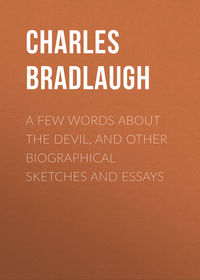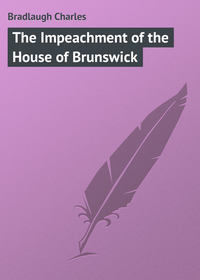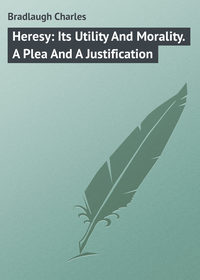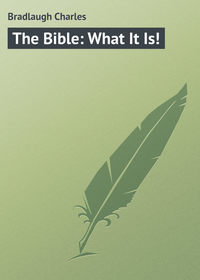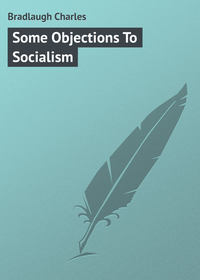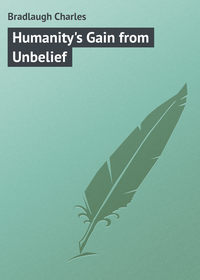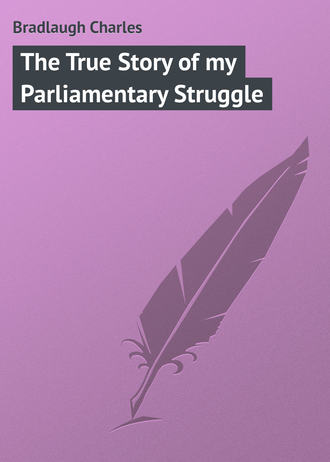
The True Story of my Parliamentary Struggle
151. Do you consider that the taking of an oath implies in the person taking it the existence of a belief in God, and that he will reward and punish us according to our deserts? – That depends upon the form of the oath; and since the decision you quoted very many forms of oath have been entirely changed by the Legislature.
152. Do you consider that if you use the word “swear,” you appeal to a God? – I consider that I take an oath which is binding upon my honor and conscience.
153. Without any reference to God? – I consider that I take an oath which is binding upon my honor and conscience.
154. And supposing that you break that oath, what what would be the consequences which you consider would result to you? – I am not aware that the Statute has provided that I shall declare my opinion upon those consequences.
155. Am I to understand that you decline to answer? – I am objecting that the question is one which would not be put in a court of law, and therefore, much more, should not be put here.
156. In answer to the Attorney General, and in your statement also, you used the words “essential part of the Oath,” and the words of the Oath are, “I do swear that I will be faithful and bear true allegiance to Her Majesty Queen Victoria, her heirs and successors, according to law;” do you consider that all the words there present to your mind are equally definite and clear meaning? – I consider that the whole of those words are essential; I hold them to be essential, and I submit myself to the construction which the Court has put upon them.
157. Is there any word in the Oath in the Statute which does not convey to your mind any clear and definite meaning? – There is no word in that which does not convey to me a clear and definite meaning.
158. And do you regard the words at the end of it, “So help me, God,” as conveying any definite meaning, or merely as a useless addendum to the promise? – I object that this Committee will not ask me my opinion upon those words, because they have been held by the highest court of law in this realm, subject to appeal, to be no necessary part of the Oath.
159. Sir Henry Jackson: If your counsel were here I should put to him this question, which do not answer if you object; I will treat you as if you were your own counsel; I understand your view to be that the Act of 1866 or the Act of 1868, gives you two alternative methods of taking your seat, the one of affirmation and the other of oath, and that it is open to you to take whichever of the two you prefer; you prefer the affirmation, but it having been decided not to be competent for you to make the affirmation, you now propose to take the Oath? – That is exactly my construction.
160. Now I will tell you my doubt, and perhaps you will be good enough to tell me what you say upon it. It occurs to me that these two alternatives are what lawyers call true alternatives; that is to say, that each excludes the other, and that the Committee having decided (perhaps you will say erroneously) that you cannot affirm, you have by your claim to affirm excluded yourself from the alternative claim to take the Oath; are not the two mutually exclusive? – No; the House of Commons decided that, fortunately for me, and that saves me the trouble of thinking on it for myself. When John Archdale applied to affirm, the House held that he could not affirm, and they ordered him to take the Oath.
161. Was that under the Statute which regulates the present procedure? – No, but it was under the claim of a man who thought that he had alternative courses, and who refused to take the Oath.
162. That is the answer which you give to my doubt? – I am not sure whether I have answered fully.
163. You do not condescend to any argument upon the Statute, but you think that the one alternative is not exclusive of the other? – I thought then, and subject to the Report of the Committee against me, which I presume binds me, I should still think that I have the right to affirm, and if there were any way in which I thought I could legally raise the question, I should try to do so.
164. But on the hypothesis that the decision of the Committee was right, have you anything except the Archdale precedent, from which you would argue that these two Acts of Parliament do not create two mutually exclusive alternatives? – I should simply reply that if that be so, and you told me that I did not come within the one, I must come within the other.
165. Mr. Staveley Hill: I wish to ask you one question with reference to what took place before Lord Justice Brett (then Mr. Justice Brett), and, of course, if you think proper, you will take the objection as you did to what the Attorney General asked you: when Mr. Justice Brett admitted you to affirm, what steps did he take with a view to satisfy himself that an oath would not be binding upon your conscience? – He put to me the question, “Why?” and I gave to him three words as an answer, and these three words apparently satisfied him, and he directed the clerk to allow me to affirm. He put no question to me as to whether the oath was binding upon me or not.
166. Have you any objection to tell the Committee what those three words were? – The question put by Mr. Justice Brett was, “Why?” I object to tell the answer, because it would be an inquiry into a man’s religious opinions, and Sir George Grey, in introducing the Parliamentary Oaths Act in 1866, under which I claim, said, “We will make no inquiry into any man’s religious opinions; let the constituencies be the judges of that.”
167. But those three words, whatever they were, satisfied Mr. Justice Brett that an oath would not be binding upon your conscience? – I cannot say that, but they satisfied him sufficiently that he gave the clerk directions to allow me to affirm.
168. When did that take place? – About eight years ago, speaking roughly; it may be six or seven years, but I am not certain about the time.
169. Was it reported in the newspapers, and is it generally known? – I am not sure; there have been cases reported.
170. Mr. Pemberton: I wish to ask whether, since you were returned as a Member of this House, and since the Report of the last Committee, you authorised the publication of a letter which appeared in the newspapers of the 21st of May in reference to the proceedings which have taken place on this matter? – I ask that the question may not be put to me, because I say that the House has already decided that they will not put any inquiry to a member as to what happens outside the House to determine what was consistent with the Oath, or not.
171. Of course I do not press the question more than to remind you that it had reference to proceedings which have taken place in this House, and in a Committee of this House? – Many things I have read (I do not know whether they are accurate or inaccurate), speeches made by Members referring to proceedings in this House, and to that Committee in relation to this matter. To put it roughly, I should submit that this Committee should not examine me as to extra-Parliamentary utterances in reply to extra-Parliamentary utterances. For example, one honorable Member, Sir Henry Drummond Wolff, made a speech at Chichester —
172. Lord Henry Lennox: Not at Chichester? – The papers said so; they may be very likely wrong, only it shows still more, I submit, the force of the objection that extra-Parliamentary publications in reply to extra-Parliamentary utterances should not be the subject of questions before this Committee.
173. Mr. Pemberton: I will only again point out that it was not in reply to an extra-Parliamentary utterance, but had reference to proceedings in this House? – That assumes what would be passing in the mind of the writer and what he had in view in assuming it, and I decline to discuss any subject of that kind.
174. I am to take it that you decline to answer the question? – No, I object to answer it. If the Committee think that I ought to answer it I will answer it. I do not take a legal objection. You quite understand that if the Committee think I ought to answer it, I will answer it at once.
The Committee deliberated.
Chairman: The Committee have come unanimously to the conclusion that the question put by the honorable Member for East Kent ought to be answered; but, in arriving at that conclusion, I am requested to inform you what I will now read: “That the Committee think Mr. Bradlaugh should answer the question put to him by Mr. Pemberton, on the ground that it refers to matters written by him directly in relation to the question involved in the order of reference to the Committee, and for the purpose of expressing his views on such questions since the claim was made by him to make the affirmation, and before the appointment of the Committee.”
175. Mr. Pemberton: I wish to ask whether, since you were returned as a Member of this House, and since the Report of the last Committee, you authorised the publication of a letter which appeared in the newspapers of the 21st May, in reference to the proceedings which have taken place on this matter, such letter being signed in your name? – I think one of the members of the Committee has a copy, which I handed to him; I have not seen the print; and as I sent to all the newspapers a lithographed copy, I prefer, for greater accuracy, to ask him to return it to me. I hold in my hand a copy which I have no doubt is the same.
176. Chairman: Do you object to that letter being put in? – The moment the Committee decided that I ought to answer that question, I had no reserve in saying that I left myself in the hands of the Committee on it. I shall take the liberty of wishing to address a word or two to the Committee presently upon it. (The letter was handed in.)
177. Mr. Watkin Williams: Do you propose to take the Oath in the form given in the Statute of 1868, which I will read to you: “I., A. B., do swear that I will be faithful and bear true allegiance to her Majesty Queen Victoria, her heirs and successors, according to law. So help me, God?” – I do, that being the form in the Statute.
178. If you are permitted to take that oath, do you intend the Committee to understand and believe that it will be binding upon your conscience as an oath? – Yes.
179. In taking such oath, do you consider yourself as appealing to some Supreme Being as a witness that you are speaking the truth? – I submit that having said that I regard the oath as binding upon my conscience, this Committee has neither the right nor the duty to further interrogate my conscience.
180. Sir Richard Cross: You know of course that in taking the oath in the form prescribed by the Statute, and according to the custom of taking oaths, you will have to kiss the Testament: do you attach the smallest weight to the kissing of that book? – I attach the weight attached by the law to the whole of the formula.
181. Do you attach the smallest weight to the kissing of the book; do you think that the kissing of that book adds in the slightest degree to the weight upon your conscience of the words which you have already spoken without kissing the book? – The law has said that the whole of that is to be complete; I have not the right, therefore, to form an opinion, or to formulate an opinion as to how much of that I would leave out had I any choice in the matter.
182. Then do you attach any further importance to the word “swear” in the oath itself, and to the fact of the kissing of the book than if the word “swear” were written “affirm,” and no kissing of the book were required? – I have already said that I attach to the complete affirmation the most complete binding effect on my conscience. If I were allowed a preference, I would and still prefer the affirmation. The law says that the oath is the form, and I shall regard that form as in all its respects binding upon my conscience.
183. Do you look upon the kissing of that particular book as adding any more sanction than the kissing of any other book? – I decline to do that which the law has not done; the law has not split up the formula into parts, and expressed an opinion upon each part separately, and I deny the right of the Committee to ask me to do that which the law has not done.
184. I will ask you one other question; do not answer it unless you like? – I will not.
185. Do you think that the fact of the kissing of that book has any relation to an appeal to a Supreme Being, that you will, before Him, perform the oath which you have taken? – The law has not required me, in any case, to express an opinion as to that by itself. As to the whole Oath I have expressed an opinion.
186. As regards the kissing of that book, would you look upon that, so far as your conscience is concerned, as an idle form? – The law has not required me to look upon it by itself, and I dispute the right of the Committee to divide the Oath into parts, and to take one part by itself without the other. I have already answered that the whole of the Oath when taken by me, and if taken by me, will be binding upon my conscience.
187. But still you consider that a certain part of that Oath, which the Statute imposes upon you the necessity to take, is an idle, and empty, and meaningless form? – I have never said so at any time.
188. But do you consider it so? – Most certainly I do not consider the most considerable portion of it an idle and empty form.
189. Some portion of it, I said? – I consider no portion of the essential Oath an idle and empty form.
190. That is to say, that you would take the Oath because the Statute says you must do so in order to take your seat? – That is not so. I take the Oath because the Statute says that I must do so, intending to be bound in my honor and conscience by the oath I take. Every Member takes the Oath because he must do so in order to take his seat, and he could not take it without it.
191. But you do not think that the forms of the Oath, as settled by law, adds anything to the binding of your conscience further than saying “I solemnly affirm”? – Your question presumes a form of thought which I have not enunciated.
192. Mr. John Bright: Do I understand you aright that you have never said that the oath, as you propose to take it, is less binding upon your conscience than it is supposed to be on the consciences of other men? – I have never said so; and in 1868, when I stood for election, there being then no form of affirmation possible for me, I had gravely considered the question.
193. It is within your knowledge that some men, and not a few men, who do not absolutely refuse to take an oath, still greatly prefer to make an affirmation? – If it would not be impertinent to say it, many Members of the House have told me so since this question has been pending.
194. Chairman: I think you said, when I informed you that the Committee thought that the letter should be put in, that it was a subject upon which you wished to make an observation? – I wish just to make the slightest observation upon that, and upon one or two points that arose in questions that have been put to me. If the Committee would allow me to think for a moment I believe I can compress it within very slight limits.
195. Sir Gabriel Goldney: Your statement to Mr. Justice Brett, I understood, you would think over? – No, that my answer did not apply to. If the Committee think that I ought to answer that question in the same way, the question as to the three words, or rather four words, that I answered to Mr. Justice Brett, I am quite in the hands of the Committee, and I should not decline to answer them.
196. Mr. Staveley Hill: The reason why I asked you what they were, and where they were to be found if you did not answer the question, was on purpose that one might look for them, because it must be a matter of public notoriety what the words were? – I should think it very possible. I have taken my objection, and if there is even a thought in the Committee that I had better answer the question, I should not object to do so.
197. Chairman: What are the observations which you wish to offer in consequence of your examination? – As the House will now have before it the statement, I ask the Committee in examining it to take it complete, not to separate one or two words in it and to take those without the countervailing words, and to remember that in this letter I declare that the oath, if I take it, would bind me, and I now repeat that in the most distinct and formal manner; that the Oath of Allegiance, viz.: “I do swear that I will be faithful and bear true allegiance to her Majesty Queen Victoria, her heirs and successors, according to law,” will, when I take it, be most fully, completely, and unreservedly binding upon my honor and conscience; and I crave leave to refer to the unanimous judgment of the full Court of the Exchequer Chamber, in the case of Miller v. Salomons, 17th Jurist, page 463, and to the case of the Lancaster and Carlisle Railway Company v. Heaton, 4th Jurist, new series, page 708, for the distinguishment between the words of asseveration and the essential words of an oath. But I also desire to add, and I do this most solemnly and unreservedly, that the taking and subscribing, or repeating of those words of asseveration, will in no degree weaken the binding effect of the oath on my conscience. I should like, finally, simply to submit to the Committee, and especially to the honorable and learned gentleman on the left of the Chairman, that there has not been from the beginning to the end of this matter, any declaration, either distinct or implied, that the Oath if taken by me would be less binding upon me than upon him; and I do submit to this Committee that this House has never sought to inquire or to distinguish in any fashion as to the religious views of its Members, except so far as any of them have found themselves obliged by their conscience to refuse to comply with some form that the House has put before them. On the contrary, in the Lords’ protest on the discussion of the Promissory Oaths Municipal Bill, Lord Holland and other Lords put it in the most distinct fashion that no sort of inquisition and no sort of inquiry ought to be tolerated involving any examination of a man’s theological views. Lord Holland added, in words better than I can command: “That there is no tribunal which he knows competent to make that examination, and that the purely secular and political duties called upon to be performed were not such as to entitle that examination to be made.” I thank the Committee for having listened to me, and I submit myself to their decision.
198. Chairman: You mentioned some precedents which you thought might usefully be added to the list of precedents which we have already had: could you conveniently add those cases? – Yes, I will do so.
Monday, 7th June 1880MEMBERS PRESENT:Mr. Attorney General.
Mr. John Bright.
Mr. Secretary Childers.
Mr. Chaplin.
Sir Richard Cross.
Mr. Gibson.
Mr. Grantham.
Mr. Staveley Hill.
Sir John Holker.
Mr. Beresford Hope.
Mr. Hopwood.
Lord Henry Lennox.
Sir Henry Jackson.
Mr. Massey.
Major Nolan.
Mr. Pemberton.
Mr. Serjeant Simon.
Mr. Solicitor General.
Mr. Trevelyan.
Mr. Walpole.
The Right Honorable Spencer Horatio Walpole, in the ChairMr. Charles Bradlaugh, a member of the House; further Examined199. Chairman: There was some reference, I think, made to you by Mr. Whitbread, with regard to which you desire to make some observations? – There was a point urged by Mr. Whitbread upon the first Committee. I do not know whether I should be in order in referring to it. I thought it had been sufficiently covered by what I had said, until I reflected upon it, and then I thought it had not. I wish to submit to this Committee that it ought not to consider that I claimed to affirm because I regarded the oath as not binding upon my conscience, under the spirit of the Evidence Further Amendment Act, 1869, for that Statute runs: “If any one shall object to take an oath, or be objected to as incompetent to take an oath;” and that it is quite possible (perhaps wrongly, and undoubtedly wrongly, as the Committee have so decided) that I might claim to affirm, objecting to take the oath, and that the Committee have not on the evidence here either the right or the duty to assume anything more as against me in dealing with it now. That is all I wish to put before the Committee.
APPENDIX
Appendix No. 1PRECEDENTS RELATIVE TO PARLIAMENTARY OATHSPRECEDENT of a Member disabled for having sat in the House without taking the OathSir John Leedes hath been in the House and not taken the Oath.
Sir John Leedes not to come into the House till further Order.
Sir E. Coke: That by the law Sir J. Leedes is disabled to serve this Parliament, and therefore ought to be discharged, and a new Writ.
Mr. Pawlett, accordant.
Sir J. Strangways: Can pretend no ignorance, for a Member of the House last Parliament.
Mr. Crew, for Sir J. Leedes: No question but he is incapable. 2. He is to be punished.
Resolved, Sir J. Leedes incapable of being a Member of this House, as if never returned.
Mr. Hackwyll: To have him removed; a Writ for a new choice; and to punish him, by sending him to the Tower.
Sir G. Moore: To have no question made, but where it is questioned.
Mr. Secretary: The fault great, especially because of last Parliament. To order, he shall be discharged now, and to serve no more this Parliament.
Sir J. Leedes, brought to the Bar, confesseth he was of the House last meeting in Parliament; and that he hath sit this Parliament in the House, and hath not taken his Oath.
Mr. T. Fanshaw: That he must be punished as one that hath come into the House, not being chosen.
Sir E. Sandes: To pay the Serjeant his fees, and no further punishment; because, but negligence, no presumption, and is willing to take the Oath.
Mr. Chidley: To have an order to disable him for this Parliament.
A Warrant for a new Writ in his room.
PRECEDENT of a Member Admitted to sit without taking the Oaths of Allegiance and SupremacyOrdered, That William Ayres, Esquire, being legally elected and returned a Member of this House, his election being returned and remitted of Record, shall be admitted to sit in this House, without taking the Oaths of Supremacy and Allegiance.
Ordered, That an Ordinance be brought in by Mr. Lisle, to-morrow morning, for repealing that clause in the Act of * * That no person be admitted to sit as a Member of this House, before he hath taken the Oath of Allegiance and Supremacy.
Ordered, That all and every the Sheriffs of the respective counties in England and Wales do henceforth execute their several places and offices of Sheriffs of their several and respective counties, according to the duty of their said office, without taking the Oaths of Allegiance and Supremacy.
PRECEDENT of a Member Discharged for declining to take the OathsThe House being informed, that Sir Henry Mounson attended, according to the Order on Saturday last;
Resolved, That he be called in, and tendered the Oaths and Declaration directed to be taken, made, repeated, and subscribed by the Members of the House.
He was called in accordingly; and came up to the table: And Mr. Speaker acquainted him, That the House had taken notice that he had been about the town a considerable time; but yet did not attend the service of the House: And that he had directions to tender him the Oaths and the Declarations.
Whereupon, Sir Henry Mounson said: That he was sorry that for some reasons he could not comply to qualify himself to sit in the House: But that those reasons would no way incline him to disturb the Government; and that he submitted himself to the House.
And then withdrew.
Resolved, That Sir Henry Mounson be discharged from being a Member of the House.
New Writ Ordered.
PRECEDENT of a Member Discharged for declining to take the OathsThe House being informed, That the Lord Fanshaw attended at the door, according to the order of Saturday last.
Resolved, That he be called in, and tendered the Oaths and Declaration, directed to be taken, made, repeated, and subscribed by the Members of the House.
He was called in accordingly; and came up to the table: And Mr. Speaker acquainted him, That the House had taken notice that he had been about the town a considerable time; but yet did not attend the Service of the House; and that he had direction to tender him the Oaths and Declaration.


